IF YOU DON’T WANT TO READ MY RUMINATIONS ON THESE THREE BOOKS JUST JUMP TO THE BOTTOM AND CLICK THE LINK TO OUR SECURE ORDER FORM PAGE.
HERE IS OUR SPECIAL DEAL WITH THESE THREE EXCEPTIONAL TITLES
BUY ALL 3 – GET 30% OFF
BUY ANY 2 – GET 20% OFF
BUY JUST 1- GET 10% OFF
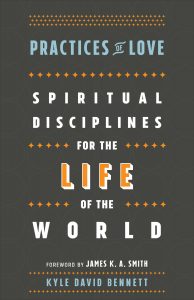 Practices of Love: Spiritual Disciplines for the Life of the World by Kyle David Bennett (Baker) $16.99
Practices of Love: Spiritual Disciplines for the Life of the World by Kyle David Bennett (Baker) $16.99
 Costly Love: The Way to True Unity for All the Followers of Jesus by John H. Armstrong (New City Press) $15.95
Costly Love: The Way to True Unity for All the Followers of Jesus by John H. Armstrong (New City Press) $15.95
 God Soaked Life: Discovering Kingdom Spirituality Chris Webb (IVP) $16.00
God Soaked Life: Discovering Kingdom Spirituality Chris Webb (IVP) $16.00
In our last BookNotes we mentioned why we love talking about books on integrating faith and work. Christian faith is all-encompassing, not just about going to church once a week, not just about worship or prayer or Bible reading, but is a full-orbed worldview and way of life. The Bible repeatedly reminds us that “The Earth is the Lords” and that God “so loved the world” and that Christ calls us to be “in the world” (if, granted, not “of” it.)
Some college students I was teaching this past summer teased me about getting a tattoo and I said if I ever did it would be some manifestation (following one of our daughters) of Romans 12:1-2 which invites us to fully-embodied worship in the world, non-conformed, with a renewed mind, in truly down-to-Earth spiritual service. And as anyone who knows Romans 12 knows, this includes showing love to others, even enemies. We show in our very bodies what God’s perfect will is, and it’s clear in Romans that that includes the call to love.
(And, as we will see in one of the books described below, Costly Love: The Way to True Unity for All the Followers of Jesus by John Armstrong, this is always and everywhere central to our faith and, yes, it is demanding; costly, even.)
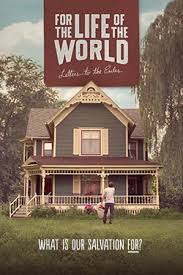 Talking religiously about down-to-Earth stuff like work (or gardening or art or science or sex or cooking or city planning) reminds us, in the immortal works of the hokey-pokey, that’s what it’s all about. We glorify God by bearing God’s image well in the world that is so loved. We are glad that the stunningly creative and colorful, fun and insightful, DVD curriculum about a sacramental worldview where all of life is to be explored called For the Life of the World asks what our salvation is for. The answer, alluding to Russian Orthodox theologian Alexander Schmemann’s book of the same title, is “for the life of the world.”
Talking religiously about down-to-Earth stuff like work (or gardening or art or science or sex or cooking or city planning) reminds us, in the immortal works of the hokey-pokey, that’s what it’s all about. We glorify God by bearing God’s image well in the world that is so loved. We are glad that the stunningly creative and colorful, fun and insightful, DVD curriculum about a sacramental worldview where all of life is to be explored called For the Life of the World asks what our salvation is for. The answer, alluding to Russian Orthodox theologian Alexander Schmemann’s book of the same title, is “for the life of the world.”
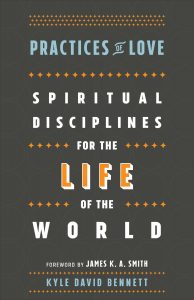 Practices of Love: Spiritual Disciplines for the Life of the World Kyle David Bennett (Baker) $16.99
Practices of Love: Spiritual Disciplines for the Life of the World Kyle David Bennett (Baker) $16.99
Kyle David Bennett ‘s brand new book has that same phrase in the sub-title, which is in a sideways kind of way, about practicing spiritual disciplines. It is a truly ground breaking book, or at least it seems to present itself that way. (He is not the first to explore the social and cultural implications of a rich interior life, but he does seem to be the first to explore it in the manner he does, working out an approach to spiritual practices, informed, it seems, by James K.A. Smith’s writing about loves and habits and practices. In this regard – although it is a very different sort of book – Practices of Love has certain similarities to the wonderful Liturgy of the Ordinary: Sacred Practices in Everyday Life by Tish Harrison Warren. If you liked that book – which we loved, as did many of our customers – you have to get this new one!)
Bennett bluntly reminds us that classic spiritual disciplines are not to be viewed like a drug to get us high (even if intimacy with God, union with Christ, and even spiritual ecstasy are commendable) but are better understood as training tools to help us love our neighbors. And that is both more urgent and a bit more complex than it sounds.
Drawing powerfully on Isaiah 58 — I assume you know it – Kyle Bennett boldly implies that if our spiritual formation disciplines don’t bear fruit in real love for others they are not only distorted but fraudulent. Isaiah 58 isn’t the only passage in the Scriptures that speaks of the hypocrisy of those who enjoy rigorous worship but are complicit in social injustice. Bennett comes on strong on a few pages here, reminding us that our lifestyles of consumerism may be vicious and that we often oppress others; he is more blunt than even some outspoken justice activists in saying this and I was almost taken aback in a few rebuking paragraphs. He takes it as a given that in our modern world we are implicated in unjust social structures, global economic systems, hurtful policies and even personal habits that are demeaning to others.  Can prayer and fasting and meditation and solitude and Sabbath-keeping equip us to live “in the world but not of it”? Can we be formed to be people who are more caring, more compassionate, more astute in our stewardship, more just in the actual things we do? That is the question; otherwise our spirituality will be indicted by the God of the law and the prophets, the God seen in the Christ who wants a seamless integrity flowing between Sunday and Monday, worship and work, prayer and politics, spirituality and society. (And we know that Jesus teaches that mercy and justice are “the weightier matters” as Matthew 23:23 puts it.) How to re-figure our views of and expectations about and actual experience of historic spiritual disciplines so we might be shaped into people with new desires and habits and ways of being in and for the world – that’s what Practices of Love: Spiritual Disciplines for the Life of the World is all about.
Can prayer and fasting and meditation and solitude and Sabbath-keeping equip us to live “in the world but not of it”? Can we be formed to be people who are more caring, more compassionate, more astute in our stewardship, more just in the actual things we do? That is the question; otherwise our spirituality will be indicted by the God of the law and the prophets, the God seen in the Christ who wants a seamless integrity flowing between Sunday and Monday, worship and work, prayer and politics, spirituality and society. (And we know that Jesus teaches that mercy and justice are “the weightier matters” as Matthew 23:23 puts it.) How to re-figure our views of and expectations about and actual experience of historic spiritual disciplines so we might be shaped into people with new desires and habits and ways of being in and for the world – that’s what Practices of Love: Spiritual Disciplines for the Life of the World is all about.
Bennett’s friend and mentor James K.A. Smith explains the theological substance of this book (naming Bennett’s influences in a way that Bennett himself does not) in a fabulously positive foreword:
Imagine a unique tree – one that grows in the soil of church fathers such as John Cassian and Gregory the Great, with roots that trace back to “old vines” in Abraham Kuyper and Soren Kierkegaard, and branches grafted from Dallas Willard and Richard Mouw. The fruit of such a tree is this book: a vision for how to do “life in the Spirit.”
Jamie then says something that nearly any thoughtful contemporary author would be proud to have said about his or her work:
If I could, I’d insert Practices of Love as volume 1.5 in my Cultural Liturgies trilogy.
Wow.
Smith continues:
Giants such as Dallas Willard and Richard Foster showed us the significance of the spiritual disciplines for sanctification: Jesus invites us to follow him by doing what he does not just thinking God’s thoughts after him. In Desiring the Kingdom (and You Are What You Love), I tried to provide an “ecclesiological assist” to their spiritual disciplines project, arguing for communal, gathered practices of worship as the hub for those other spiritual disciplines – that sacramental worship is the heart of discipleship. But in Practices of Love, Kyle Bennett expands the frame and shows us another part of the picture: all these disciplines are undertaken not just for our own relationship to God but also as a way to love our neighbor.
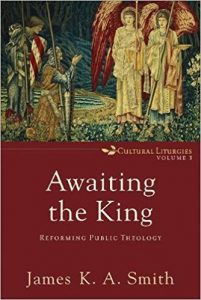 [An aside: the third volume of this magisterial, pioneering, much-discussed Cultural Liturgies trilogy by James K.A. Smith, Awaiting the King: Reforming Public Theology, will be out this November. I’ve been working through an advance version of the manuscript – yes, I do love this part of my job, thank you very much – and you can PRE-ORDER it at 20% off from us if you’d like. It follows the influential and much-discussed Desiring the Kingdom and Imagining the Kingdom and for a while had the tentative title Embodying the Kingdom. The official title now is Awaiting the King. It is very much about public theology. No wonder he likes Kyle David Bennett’s little book.]
[An aside: the third volume of this magisterial, pioneering, much-discussed Cultural Liturgies trilogy by James K.A. Smith, Awaiting the King: Reforming Public Theology, will be out this November. I’ve been working through an advance version of the manuscript – yes, I do love this part of my job, thank you very much – and you can PRE-ORDER it at 20% off from us if you’d like. It follows the influential and much-discussed Desiring the Kingdom and Imagining the Kingdom and for a while had the tentative title Embodying the Kingdom. The official title now is Awaiting the King. It is very much about public theology. No wonder he likes Kyle David Bennett’s little book.]
Bennett, like Smith, is a philosophy prof with a PhD. For those few among our readership that would remember, he did his undergrad work at Geneva College under the late, beloved philosophy professor Dr. Byron Bitar, who, alongside the “every square inch being redeemed” worldview of the Dutchman Abraham Kuyper gave him a love for the Dane, Soren Kierkegaard. In fact, some will notice that Bennett’s book has a title close to Kierkegaard’s famous Works of Love.
There are indications in the book, easy to read as it is, that Bennett is pretty philosophically minded, and it makes the book very interesting: he asks what things actually mean, what they should look like, how they fit together, how they work. He asks this about spiritual disciplines – what’s really going on when we fast or feast? what is the relationship between solitude and socializing? how does meditation help us prevent mal-formed thinking? what really is silence? what is the point of work? Without being scholarly or arcane he asks pretty foundational questions and this is good; rare, even.
 Kyle is obviously a gifted teacher, too, so he introduces useful words to help us further understand our mal-formed ways and to think and speak better about what others might call virtues and vices. For instance, in a section on fasting and food he not only talks about our “tummies” but “gormandization” which is another word for gluttonous eating. He also talks about “miserly” eating, which is a helpful way to think about certain distorted practices. He is a thinker, a teacher, and has a colorful, practical, even humorous side.
Kyle is obviously a gifted teacher, too, so he introduces useful words to help us further understand our mal-formed ways and to think and speak better about what others might call virtues and vices. For instance, in a section on fasting and food he not only talks about our “tummies” but “gormandization” which is another word for gluttonous eating. He also talks about “miserly” eating, which is a helpful way to think about certain distorted practices. He is a thinker, a teacher, and has a colorful, practical, even humorous side.
And he tells some really entertaining (admittedly brief) stories of philosophers, explaining cool stuff about how people thought Diogenes was a mad-man because he wanted to live a better quality (and less materialistic) life. He tells some informative bits about Socrates’ life, quotes Thomas Aquinas and, in a footnote, at least, cites postmodern philosopher Merleau-Ponty and an often-repeated line from Simone Weil. He’s a smart dude.
But don’t let this propensity to introduce some colorful vocabulary and quote heady scholars and a few big words fool you. In fact, Jamie Smith tells us not to worry:
Bennett’s lively prose and passionate verve will make you forget every caricature of the tweedy, elbow-patched philosopher. This is feisty Christian thinking with wit and wisdom and both eyes fixed squarely on the nitty-gritty realities of the proverbial ‘real world.’ Above all, this book is a thoughtful invitation to live like the new creatures that we are.
Smith could have pushed this point more: Kyle really, really is down-to-Earth, in a blue-collar everyman/everywoman kind of way. He talks about a fight he had with his wife, describes how he felt as a youth when his dad’s dad was killed in a car wreck, mentions often his love of basketball and Little League baseball, even counsels about how to better use time in the bathroom. (I know, you didn’t see that coming.) And he quotes movies – and not just high-brow ones, either. (He mentioned Elf! He mentioned Elf!) He quotes rural Wendell Berry novels and Eric Schlosser’s Fast Food Nation. He draws on the children’s books of Roger Hargreaves, like Little Miss Chatterbox. It isn’t every book that has a heavy line from Nicholas Wolterstorff about the relationship of justice and liturgy and a long footnote about Reformed theologian Herman Bavinck even as he is talking about TV shows like the British detective drama Luther and the intriguing question his daughter asked of what animal is the laziest of all. He encourages us to love our neighbors in the “itty bitty” things and asks how we feel when we “veg out” all weekend. He talks about working (not very successfully) as a bricklayer and having a crummy time working at “slapping meat on stale bread” at Subway.
So, again, passionate and broad-minded and fun-to-read and down-to Earth raw as it is, Practices of Love is asking readers to rethink our assumptions about spirituality. Faith-formation doesn’t just happen in church and it just doesn’t happen in quietude and daily devotional times. In fact, he wants to see all of life as deeply spiritual, all human endeavors as related. Spiritual disciplines aren’t to be compartmentalized as discreet activities, really, since all that we do is spiritual (see — I started off with that Romans 12:1 verse for a reason! In a way, this book is asking what does spirituality look like if Romans 12:1 about all of life, what Eugene Peterson calls “our everyday walking around life” being worship is really true.)
Bennett’s approach assumes a view of the human person that is obviously embodied, cultural, social, and multi-faceted and that all the dimensions of our lives – feeling, thinking, spending, consuming, talking, working, resting, and the like – are all uniquely unfolded before God. (He even has a few illustrations making the point.) We should not consider spiritual disciplines as some eccentric, monkish formational habits for the super-pious or introverts who just want to get away to work on their so-called “spiritual life.” Our methods of coming more deeply to know God are embodied in various dimensions of our God-ordained creatureliness.
In fact, the book challenges what most of us think about the practices of spiritual disciplines because he insists (over and over) that they are not something other than what we ordinarily do as humans. It becomes a refrain that we aren’t being invited to do new or different things, but to do ordinary things differently. We are mal-formed in each side of life and we need to be re-formed, re-calibrated, re-directed away from self and idols and towards love of others. In this approach we don’t so much adopt esoteric spiritual techniques to gain spiritual feelings but just enter into ordinary life in a new way, inspired by the transformed heart and habits nurtured within us, making us more Christ-like. With attentive practice, the image of the Triune God more powerfully is reflected in our walk through the world. Bennett implies that the early church fathers and mothers knew this – he avoids those mystics that focused on esoteric encounters or who sought after ecstasy — and that we can take their ancient pastoral advice to heart, even in our modern times. For instance, he writes, after a clever string of apparent differences between a modern and an ancient person,
What hath fourth-century Egypt to do with twenty-first century El Paso? Our lives may take different shapes and twists and turns but the cashier and the cenobite, the hedge fund investor and the hermit, the nun and the nurse are not so different.
After all, the commonplace human experiences of the ancients – their joys and temptations – are similar to ours. Bennett continues,
Like them, we do basic, ordinary activities every day. We get dressed, we buy things and take them home, we think, we eat, we hang out with friends, we talk (a lot), we work (a lot), and we rest.
In fact, he uses some version of a long phrase several times (and as the chapters unfold you see why) to explore these universal human experiences. He writes about how we all think, eat, socialize, talk, own things, work and rest. Each of these things can be transformed into acts of true love and grace as they are infused with new spiritual energy and virtue. For instance, the discipline of practicing silence helps us speak better; the ethic of service infuses how we work; the attitudes of simplicity helps us steward better those things we do own, fasting helps us feast well. You get the picture, I’m sure, but he helps you connect the dots. The helpful insight he has as we learn about this is remarkable.
I suspect that if you are at all like me, you will find some things to disagree with in this provocative book. A few sentences made me stop reading to ponder why a word was chosen or an attitude conveyed. I frankly think that some of it might have been edited a bit differently – I’m sure when he talks about the public square and the common good and mentions “blankets to be shared in common” he doesn’t mean what is sounds like. And why sound so glib in saying “Dying for another person is quite easy compared to living for another person.” An easy martyrdom? Weird.
As much as I agree with the stellar blurbs on the back – from remarkably thoughtful folks like Dennis Ockholm, John Wilson, Rebecca Konynkyk DeYoung, Vincent Bacote, and Gideon Strauss – I need to struggle more with the first few chapters where he doesn’t offer the sort of clear definitions that I wished for. I found his logic a bit convoluted, even though some of the writing was powerful. I really like his energy and all the major points he makes. But I really have to ponder his meaning a bit more.
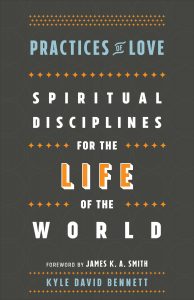 The heart of the book is comprised of a set of chapters each showing how a certain spiritual discipline can reform our habits and practices in that side of life (again, meditation helps us think, solitude helps us socialize, and the like.) These are brilliant, wise, curious, fascinating, each making the case that spiritual formation is about love. He reminds us in creative and compelling ways that while there is a “vertical” dimension to spiritual disciplines, we should explore with equal vigor the “horizontal” or “sideways” implications of how our spirituality shapes how we relate to others, from strangers and neighbors to co-workers and enemies. In this he is not dissimilar to others who have invited us to find God in the ordinary, to consider uniquely Christian practices, doing typically human endeavors in distinctively Christian ways, being intentional about how they help build a better world by loving others properly. As David Naugle puts it in his brilliant book, we need Reordered Loves, Reordered Lives.
The heart of the book is comprised of a set of chapters each showing how a certain spiritual discipline can reform our habits and practices in that side of life (again, meditation helps us think, solitude helps us socialize, and the like.) These are brilliant, wise, curious, fascinating, each making the case that spiritual formation is about love. He reminds us in creative and compelling ways that while there is a “vertical” dimension to spiritual disciplines, we should explore with equal vigor the “horizontal” or “sideways” implications of how our spirituality shapes how we relate to others, from strangers and neighbors to co-workers and enemies. In this he is not dissimilar to others who have invited us to find God in the ordinary, to consider uniquely Christian practices, doing typically human endeavors in distinctively Christian ways, being intentional about how they help build a better world by loving others properly. As David Naugle puts it in his brilliant book, we need Reordered Loves, Reordered Lives.
Or as John Ortberg writes in The Life You Always Wanted, spiritual training through contemplative discipline isn’t about our (so-called) “spiritual life” but is just about our life. Our real world life.
But yet, as I say, I have to ponder more about what Bennett really means as he conflates spiritual disciplines and Christianly animated human practices.
If he had consistently used the language of how our spiritual disciplines – fasting, practicing times of silence, meditation, worship, and the like – shapes and fuels and reforms our ordinary activities of daily living, then I’d fully understand and would offer an easy “Amen!”
But he only puts it that way some of the time. More often (especially in the first few chapters) he says it is not that way at all: the spiritual disciplines are not discrete activities (that have an impact upon other things we do) but are disclosed within the ordinary things we do themselves. I suspect he is trying to give some nod to the brilliant chapter of Al Wolter’s seminal Creation Regained that differentiates between “structure and direction.” He surely wants to offer a non-dualistic view of spirituality — there is no “sacred” part that “informs” our “secular” activities. So it isn’t that we (first) pray for inner guidance, say, and then we vote or work well; we don’t sit in solitude and then go out and socialize better, but, rather, he suggests that our prayerfulness is expressed in voting or working justly and our inner strength of solitude is practiced and nurtured as we love others well. (This curious resistance to conventional approaches to the spiritual disciplines is suggested in the very first page when he tells a story of talking a guy out of fasting.) Bennett really is offering a new vision of spiritual disciplines, it seems to me, even if he seems less than consistent in how he explains it. Anybody interested in this field or who has been involved in spiritual formation projects or spiritual direction really should ponder this book.
Of course, I appreciate any move towards integrated and seamless coherence, practicing the presence of God in the mundane and all, but it still seems to me that he minimizes – or just doesn’t concede — that we do need to do certain disciplines, alone, in a point in time. (We practice scales, sometimes, and we perform concertos, sometimes, even though, technically, both are playing the instrument, for real.) Sure my prayerfulness follows me throughout the day, but only if I have actually prayed. My learning about silence helps me be a better listener to others, but only if I’ve actually spent some real time working on the habits of keeping quiet. In other words, I think Kyle is wrong about the spiritual disciplines just being ordinary life done “in the Spirit” and re-formed. I think those are the results or fruit of practicing conventionally understood spiritual disciplines. Richard Foster – just to name one classic writer – described spiritual disciplines (in his classic Celebration of Discipline) under the rubric of those that were directed God-ward, those that were centered inward, and those that moved us outward. New ways of actual living for the sake of others, including the poor and oppressed and the Earth itself, is certainly central to all of Foster’s contemplative writing.
In insisting that spirituality is about formation for life, It’s not like Bennett is saying something fully novel – Ruth Haley Barton, James Bryan Smith, David Benner, Jan Johnson, Henri Nouwen, Richard Foster, Thomas Merton, Marlena Graves, Richard Rohr, Donald Whitney, Gary Thomas, Joan Chittister, Ronald Rolheiser, Gordon Smith, Marjorie Thompson, Adele Ahlberg Calhoun, Robert Mulholland, Howard Thurman, James Houston, Eugene Peterson, and nearly any other respected spiritual writer these days insists that our deep experience of God results in new ways of being in the world, attentive to God’s creation and equipped to be passionate agents of social change. (I thought of of this, I must say, when early in the book Bennett caricatured one who does spiritual disciplines in some sort of self-pleasing, self-absorbed gnosticism, and, although I’ve mocked such straw men myself probably more than he has, it didn’t ring quite true. Nobody I know well approaches spirituality in such utterly interior, selfish ways and few contemplative authors or spiritual directors guide others in such inappropriate ways.)
That is, Bennett is adding a good voice — admittedly construed in some pretty interesting ways — to the on-going conversation about spiritual formation and an intregal way of responsible living before God in the real world, accompanied by Spirit. He can take his place in this on-going conversation, but he isn’t utterly novel.
Which brings me to a final small critique of Bennett’s Practices of Love. I noted that he is bold in citing Isaiah 58 and insisting that the Bible calls us love our neighbors in ways that are concrete, seeking justice, resisting violence, being agents of reconciliation and the like. He offers powerful cultural criticism and incisive prophetic denunciations of the idols of the age. But yet, as much as he brings us to the point of seeing spiritual formation as the fuel to fire our love for others, as much as he wants us to pursue a life with God that has social implications, he doesn’t give many pointers about social and political change.
He cites the Biblical material about justice, he cares for the poor, and tells us to share our food; he gives obvious advice like how we should visit shut ins with a good meal and how we should have integrity at work and how our buying habits should be more conscientious. But at some point we have to dig a bit deeper and if our dispositions have been changed and we 
 truly “desire the Kingdom” and want to be used by God to bring help and restoration to the poor and the Earth itself, we have to work out ways to shop ethically and invest in local businesses, support nonviolent start-ups, resist the military industrial complex, alter our energy usage, resisting complicity in the principalities and powers that so damage our commonwealth. Perhaps I was hoping for some engagement with the kind of piety expressed so beautifully in The God of Intimacy and Action: Reconnection Ancient Spiritual Practice, Evangelism and Justice by Tony Campolo and Mary Albert Darling and to connect with the missional energy of books like To Alter Your World: Partnering with God to Rebirth Our Communities by Michael Frost and Christiana Rice.
truly “desire the Kingdom” and want to be used by God to bring help and restoration to the poor and the Earth itself, we have to work out ways to shop ethically and invest in local businesses, support nonviolent start-ups, resist the military industrial complex, alter our energy usage, resisting complicity in the principalities and powers that so damage our commonwealth. Perhaps I was hoping for some engagement with the kind of piety expressed so beautifully in The God of Intimacy and Action: Reconnection Ancient Spiritual Practice, Evangelism and Justice by Tony Campolo and Mary Albert Darling and to connect with the missional energy of books like To Alter Your World: Partnering with God to Rebirth Our Communities by Michael Frost and Christiana Rice.
I know the heart of this book is to re-construe how we think about spirituality and to particularly show the connections between spiritual practices that can transform our daily  habits. But if these ordinary habits are going to be reformed for the purposes Kyle says he wants — love and mercy and stewardship and public justice — it would be helpful to list practical titles that show what it looks like and how to navigate the contemporary counter-pressures once one’s habits are newly re-directed towards love and service and the work of shalom. I just itched for some citation of books such as Free: Spending Your Time and Money on What Matters Most by Mark & Lisa Scandrette or Money Enough: Everyday Practices for Living Faithfully in the Global Economy by Douglas Hicks or Julie Clawson’s informative, faith-based buyer’s guide, Everyday Justice: The Global Impact of Our Daily Choices. I think we would all do well to revisit Ron Sider’s Rich Christians in an Age of Hunger if we want to think about the spirituality of loving our neighbors in this needy, needy world.
habits. But if these ordinary habits are going to be reformed for the purposes Kyle says he wants — love and mercy and stewardship and public justice — it would be helpful to list practical titles that show what it looks like and how to navigate the contemporary counter-pressures once one’s habits are newly re-directed towards love and service and the work of shalom. I just itched for some citation of books such as Free: Spending Your Time and Money on What Matters Most by Mark & Lisa Scandrette or Money Enough: Everyday Practices for Living Faithfully in the Global Economy by Douglas Hicks or Julie Clawson’s informative, faith-based buyer’s guide, Everyday Justice: The Global Impact of Our Daily Choices. I think we would all do well to revisit Ron Sider’s Rich Christians in an Age of Hunger if we want to think about the spirituality of loving our neighbors in this needy, needy world.
 I think of the stunning ways Brian Walsh and Sylvia Keesmaat creatively explore resisting the idols of the culture and the forces of destruction in their close contemporary reading of Colossians in Colossians Remixed: Subverting the Empire and how Richard Rohr teaches about the relationship of prayer and political protest in A Lever and a Place to Stand. Heck, Martin Luther King has a book called Strength To Love that could have been held up as a useful guide.
I think of the stunning ways Brian Walsh and Sylvia Keesmaat creatively explore resisting the idols of the culture and the forces of destruction in their close contemporary reading of Colossians in Colossians Remixed: Subverting the Empire and how Richard Rohr teaches about the relationship of prayer and political protest in A Lever and a Place to Stand. Heck, Martin Luther King has a book called Strength To Love that could have been held up as a useful guide.
And as most BookNotes reader’s know, we think Steve Garber’s mature and eloquent book Visions of Vocation: Common Grace for the Common Good asks how we can “for love’s sake” live in the messy world, implicated as we are, showing God’s faithful, covenantal love for the world. I see some of Garber’s deep insights in Kyle’s approach, in fact. I think you might, too.
Perhaps I am stretching a bit here, but it might have been good to have some engagement with something like Parker Palmer’s Healing the Heart of Democracy: The Courage to Create a 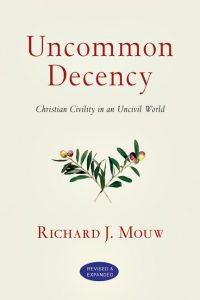 Politics Worthy of the Human Spirit which, in a spirit of gentleness and grace, invites citizens to deep conversations about the common good and the reclamation of local citizenship. If we are shaped into practices that guide our hearts to want to care for the common good, then how do we express that love in our contested political spaces? Geesh, you’d think Kyle at least would have given a shout-out to one of the lovely little books of another of his mentors, Dr. Richard Mouw, who wrote so wisely about the inner disposition of civility that could make us better neighbors and citizens and conversation partners in society. Bennett’s Practices of Love: Spiritual Disciplines for the Life of the World seems to be moving in the same direction as Mouw’s Uncommon Decency: Christian Civility in an Uncivil World.
Politics Worthy of the Human Spirit which, in a spirit of gentleness and grace, invites citizens to deep conversations about the common good and the reclamation of local citizenship. If we are shaped into practices that guide our hearts to want to care for the common good, then how do we express that love in our contested political spaces? Geesh, you’d think Kyle at least would have given a shout-out to one of the lovely little books of another of his mentors, Dr. Richard Mouw, who wrote so wisely about the inner disposition of civility that could make us better neighbors and citizens and conversation partners in society. Bennett’s Practices of Love: Spiritual Disciplines for the Life of the World seems to be moving in the same direction as Mouw’s Uncommon Decency: Christian Civility in an Uncivil World.
I hope Practices of Love make us better citizens for the life of the world, better neighbors to the immigrant and the outcast, more loving and compassionate as we contend with those with whom we disagree, so full of Christ-shaped love that we are intentional about our social practices, resisting the idols of the age, working for fair public policies for the hungry and needful and excluded. But if it does help us in this way — what next? I’d say we will need books like the great anthology about all sorts of social issues edited by David Gushee, A New Evangelical Manifesto: A Kingdom Vision for the Common Good or the inspiring Live Like You Give a Damn: Join the Changing Making Celebration by our old friend Tom Sine or maybe the brand new The Power of Proximity: Moving Beyond Awareness to Action by Michelle Ferrigno Warren. As we practice “practices of love” and see our formation “for the life of the world” it will surely lead us to grapple with what it means to be a peacemaker in these hard times. Perhaps a great follow-up to these three books I’m reviewing in this BookNotes column will be the brand new Mending the Divides: Creative Love in a Conflicted World by Jon Huckins & Jer Swigart of The Global Immersion Project, a peacemaking training organization. Jon is the author of Thin Places that — not unlike Bennett — ruminates on spiritual practices and postures that can create missional communities that care for the world.
To the book’s great credit, every chapter in Practices of Love has a prayer included at the end – meaty and beautiful and formative – and a bunch of “side steps” (a phrase playing off his horizontal or “sideways” look at the disciplines. Cool, eh?) These are practical steps to take, things to do, ways to work out these generative insights about the relationship of a certain spiritual practice and renewed, restorative, daily living. If we danced into even some of those steps our lives would be richer, our world would be served, and God – just like in the promises at the end of Isaiah 58 — would be near and present to us. If and when people of faith are better known for presenting a new reconciled way of life in and for the world, based on this rich sort of Christ-like maturity and compassionate character in service of the broken world, as described by Kyle David Bennett, God will be glorified (Matthew 5:16, Ephesians 2:10) and this book will be part of the story. It is very highly recommended, with much hope.

TWO MORE EXCELLENT NEW BOOKS THAT SHOULD BE READ ALONG-SIDE PRACTICES OF LOVE, ALSO ON SALE NOW
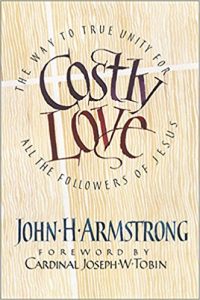 Costly Love: The Way to True Unity for All the Followers of Jesus John H. Armstrong (New City Press) $15.95 I will tell you more about this later, I hope, but I truly wanted to list it here. This is one of the most provocative and thoughtful and thorough studies of the Biblical teaching about love I have yet seen. It is serious and well researched, drawing on writers both ancient and new, from across the theological spectrum. John is a big supporter of our bookish effort, an old Wheaton College grad, a former super-strict Puritan-esque Reformed scholar and revival preacher. I liked him even when he came on a bit too stridently with his overly confident theology. Since those days, John has shifted considerably – in part motivated by studying and taking to heart a profound essay on the rightness of ecumenism by conservative Anglican J. I. Packer — and wrote one of my all-time favorite studies of this topic, Your Church Is Too Small: Why Unity in Christ’s Mission Is Vital to the Future of the Church. Under the auspices of his ACT3 Network, John has been advocating, preaching, praying, writing, and networking others for more gracious and fruitful inter-denominational conversations. It is rare to find one with such conventionally evangelical theology so robustly engaged in collegial conversations and partnerships with Roman Catholics and Episcopalians, with Pentecostals and the Eastern Orthodox, with Mennonites and Methodists. John knows all kinds of people and meets with everybody, even though it sometimes breaks his heart that others don’t share his enthusiasm for learning to love our brothers and sisters in Christ, regardless of denominational affiliation or political/cultural tendencies.
Costly Love: The Way to True Unity for All the Followers of Jesus John H. Armstrong (New City Press) $15.95 I will tell you more about this later, I hope, but I truly wanted to list it here. This is one of the most provocative and thoughtful and thorough studies of the Biblical teaching about love I have yet seen. It is serious and well researched, drawing on writers both ancient and new, from across the theological spectrum. John is a big supporter of our bookish effort, an old Wheaton College grad, a former super-strict Puritan-esque Reformed scholar and revival preacher. I liked him even when he came on a bit too stridently with his overly confident theology. Since those days, John has shifted considerably – in part motivated by studying and taking to heart a profound essay on the rightness of ecumenism by conservative Anglican J. I. Packer — and wrote one of my all-time favorite studies of this topic, Your Church Is Too Small: Why Unity in Christ’s Mission Is Vital to the Future of the Church. Under the auspices of his ACT3 Network, John has been advocating, preaching, praying, writing, and networking others for more gracious and fruitful inter-denominational conversations. It is rare to find one with such conventionally evangelical theology so robustly engaged in collegial conversations and partnerships with Roman Catholics and Episcopalians, with Pentecostals and the Eastern Orthodox, with Mennonites and Methodists. John knows all kinds of people and meets with everybody, even though it sometimes breaks his heart that others don’t share his enthusiasm for learning to love our brothers and sisters in Christ, regardless of denominational affiliation or political/cultural tendencies.
Such relationships has softened him, so to speak (or toughed him up, since he no longer only hangs out with those like himself.) He has learned to be civil and gracious and recognize the good stuff God is doing in communions and ministries unlike his own.
It is a longer story to share another time but John has come to very deeply understand – he feels it in his bones as much as anyone I know – that for Christian community to develop and for something even approximating Godly unity (of the sort he calls “missional ecumenism”) will take a lot of healing, a lot of honest conversations, a lot of humility, a lot of grace extended. We desperately need to understand, encounter, and manifest God’s love. John 13 couldn’t be clearer about the urgency of Christians loving others – see Francis Schaeffer’s lovely little The Mark of the Christian or Art Lindsley’s Love: The Final Apologetic for starters on this extraordinary truth – but it seems we are ill-equipped to live out that kind of Christian love for one another. And, oddly, those who seem to know the most about the Bible and about theology are often themselves the most stubborn and hurtful when it comes to resisting efforts to tear down the dividing walls.
Surely the answer to this broken situation, this tragic violation of the new commandment of John 13:34, is love. God is love, after all. As Kyle David Bennett so creatively spells out in his book Practices of Love, our spirituality must yield the fruit of love. Out of Armstrong’s own frustrations and eagerness to press towards greater conversations and shared ministry, he set out to study love. It is the essential mark of the Christian disciple, of course, so it is important for any and all of us. But it was especially urgent for him and his new call into ecumenical, missional fidelity. It seems odd that so little of much depth has been written directly on this topic.
And so, Costly Love: The Way to True Unity for All the Followers of Jesus is the fruit of several years of study and several years of writing. John is a studious scholar, and a fine, upbeat writer. This book is – I don’t say this cheaply – a true labor of love.
I had the great privilege of writing an early endorsement of Costly Love, and I hope to describe it for you in greater detail, later. For now, please know of its good back-story, its semi-scholarly tone, its great, great worth. I hope you consider buying this from us – it is published by a fine Roman Catholic publisher, and the beloved Cardinal Joseph W. Tobin wrote the foreword. (It’s not every day that an evangelical like John ends up on a Roman Catholic press, but that, too, is a sign, it seems of how special this book is and what it represents.) This book needs to be better known in our (mostly Protestant) circles and I commend it to you.
There are many solid endorsements of this book from a wide variety of important women and men, theological and church voices. For instance:
Good books make you think, great books provoke you to change John Armstrong has given us a great book that has the potential to transform churches and leaders. Costly Love presents a vision of life that is biblically faithful and consistently congruent with reality. This is as timely a work on this subject as any I have read. This is surely a book we all need for our divided times. Rev. Tyler Johnson, Lead Pastor, Redemption Church, Phoenix, AZ
Love is the best thing we have – and yet we struggle to describe it, let alone live into it. That’s because love is a cross and an empty tomb; love is knitting the church back together and saving the world. John Armstrong is perfectly placed to write about love – with evangelical zeal, catholic wisdom, and erudition without obscurity. Dr. Jason Byassee, Vancouver School of Theology and Duke Divinity School
 God Soaked Life: Discovering Kingdom Spirituality Chris Webb (IVP) $16.00 I can only hint about this now as I have not yet read it in full., but I am confident it fits in well with this column. In fact, I think it may be an absolutely perfect companion volume for Bennett’s Practices of Love as it ends up (and I suspect is pervaded by throughout) with a strong section on the politics of love. It draws on the literature and stories of those who have lived well in the public square inspired by deep spirituality and God-given love. In some ways it gives examples of the sorts of neighbor-loving, creation-caring, justice-seeking humble saints that Bennett’s construal of spiritual practices hope to evoke.
God Soaked Life: Discovering Kingdom Spirituality Chris Webb (IVP) $16.00 I can only hint about this now as I have not yet read it in full., but I am confident it fits in well with this column. In fact, I think it may be an absolutely perfect companion volume for Bennett’s Practices of Love as it ends up (and I suspect is pervaded by throughout) with a strong section on the politics of love. It draws on the literature and stories of those who have lived well in the public square inspired by deep spirituality and God-given love. In some ways it gives examples of the sorts of neighbor-loving, creation-caring, justice-seeking humble saints that Bennett’s construal of spiritual practices hope to evoke.
This final set of chapters in God Soaked Life, in fact, are vital, since this is a central part of the vision of “Kingdom spirituality” as described by Webb. That is, like with Bennett and Armstrong, above, we are called to live out daily lives of great love, shown forth in concrete practices and a lifestyle of compassion and grace. We are citizens of a Kingdom of Love, bearing the image of a God who is Love. Here, in fact, are the evocative final chapter titles in God Soaked Life all offered in this final section called “The Politics of Love.”
Against the Darkness
Glorious Possibilities
The Kingdom Today
There are seven such units in God Soaked Life with three chapters under each (and an “over to you” section which includes conversation questions, reflection pieces and other good stuff to process the material.) The sections include chapters about a “God Soaked Creation” and an invitation to life in God’s delight; there are moving chapters about “heart renewal” and it seems that Webb is particularly honest about our hurts, our brokenness and the need for what he calls “soul healing” with several such chapters on our hurting human condition. This leads to some good chapters on “Fearless Honesty” and then what it means to be “Close to the Father’s Heart.” These short chapters all look beautiful and rich — perhaps not uncommon insights, but really, really nice. Our journey to God needs these kinds of promptings and guides and I think even the discussion parts are themselves so very, very good. Webb is a very good writer and I personally look forward to reading this slowly (and putting it into conversation with Bennett, as well.)
Webb reminds us that spirituality isn’t a solo project and has several chapters under the heading “Creating Community” and, gladly, shows how all this is lived out in the quotidian, with chapters about attentiveness and “learning to see.” Yes, yes, God is in all things – Webb reminds us of beauty, wonder, joy, and the gospel-based redemption of all things! But there is this hard fact that we live in a damaged world; things are not as they are supposed to be. So we truly need God, we need community, we need eyes to see and then we need those final chapters, “The Politics of Love” because we must be agents of this God-drenched goodness into the world. We must “learn to love in gentleness” he writes, and I think as a Benedictine Anglican priest – and former president of the Richard Foster-founded Renovare USA – he knows what he’s talking about.
 Do you know his previous book, The Fire of the Word: Meeting God on Holy Ground which was about reading the Bible with an eye to spiritual formation? In a way it was an extended introduction to lectio divina and was a beautiful, helpful book beloved by many of our customers. This brand new one similarly proclaims that God is near. It is “written with verve, depth, and uncontainable joy.” This invitation to “live in the reality of God’s presence in everyday lives” is so nice, and so needed.
Do you know his previous book, The Fire of the Word: Meeting God on Holy Ground which was about reading the Bible with an eye to spiritual formation? In a way it was an extended introduction to lectio divina and was a beautiful, helpful book beloved by many of our customers. This brand new one similarly proclaims that God is near. It is “written with verve, depth, and uncontainable joy.” This invitation to “live in the reality of God’s presence in everyday lives” is so nice, and so needed.
Barry Hill, an Anglican rector colleague of Webb’s in Leicester, UK, says:
Chris Webb models God’s beautiful call to grow as a disciple with our head and our heart, our whole bodies and our whole lives, without division or separation.
Gary Moon – director of the Dallas Willard Center at Westmont College – agrees, saying That God Soaked Life is “a beautifully written and immensely important book about living life with God.” He continues, saying it “sets aglow everyday life with the light of Kingdom living.”
Yep, that’s what love can do. Bennett, Armstrong and Webb can help you live love
REMEMBER OUR SPECIAL DEAL:
· BUY ALL 3 BOOKS GET 30% OFF
· BUY ANY 2 BOOKS GET 20% OFF
· BUY JUST 1 BOOK GET 10% OFF
BookNotes

order here
takes you to the secure Hearts & Minds order form page
just tell us what you want
inquire here
if you have questions or need more information
just ask us what you want to know
Hearts & Minds 234 East Main Street Dallastown, PA 17313
read@heartsandmindsbooks.com
717-246-3333
